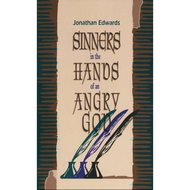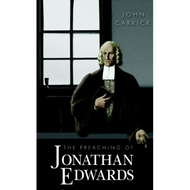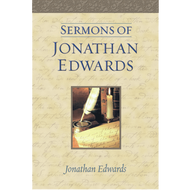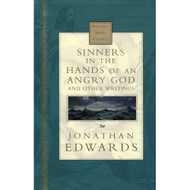Categories
Categories
Sinners in the Hands of an Angry God, Made Easier to Read by Jonathan Edwards & John Jeffery Fanella (Booklet)
Sinners in the Hands of an Angry God, Made Easier to Read by Jonathan Edwards & John Jeffery Fanella (Booklet)
Product Description
About the Author
Lynne Edwards is a trusted 'brand' within the quilt world, loved for her friendly approach and reliable authority. Her previous books have consistently sold well, and in recognition of her contribution to arts and crafts she was awarded an MBE in December 2007. Lynne teaches regular quilt-making classes all over the world, as well as near her home in Ipswich, UK.
Publisher's Description
An easier-to-read version of Edwards' classic sermon.
Endorsement
This particular sermon from Edwards has been trumpeted by some as the greatest sermon given on American soil, while being vehemently attacked by others as puritanical fire and brimstone of a backwards age. Oddly enough, there are elements of truth in both sentiments, more the former than the latter however. While unquestionably hitting on many timeless truths that are relevant in any period of time, the genius of the sermon really comes out when one considers the historical context in which the sermon was given.
Contrary to many negative reflex and often revisionist reactions we tend to hear today about puritanism and Edwards, Edwards was not a constant fire and brimstone preacher. The writings of Edwards reveal a man who spoke much more on the grace and mercy of God then of His wrath. But really, the two go hand in hand. There's no need for God to be merciful if there's no eternal wrath to fear. There's no need for God to show grace to human beings if there's nothing bad enough in human beings to warrant divine punishment. It is impossible to adequately discuss God's mercy and grace without also dwelling very intently on the wretchedness of man and the divine justice that must be exacted if we believe that God is perfectly holy. This is the context in which this sermon by Edwards was given. He was invited to preach at a church that was spiritually dead and dominated by a spirit of skepticism and a deeply entrenched disbelief in the need for radical personal conversion. Such is the attitude that can be found in many churches today. Yet contrary to what happens each Sunday in these kind of churches all across America, the preacher at this particular church found such comfortable skepticism not to be a virtue of an enlightened congregation, but as a cancer that ensured that many in his church would go unsaved if things didn't change. Enter Jonathan Edwards, and his sermon to this church on that day changed the people in that church and made a lasting impact on American Christianity that is felt to this day.
The main purpose of the sermon, contextually speaking, was to abruptly dislodge and disrupt the culture of apathetic skepticism that reigned in this church. Edwards attempted to do this by drawing haunting imagery of God's mercy in all things, ensuring the congregation that the only reason they are even breathing is because of God's grace. He paints a picture of man dangling over an eternal fire, and stressing that this is where man finds himself right now, and that the only reason he doesn't fall in is because God (and a very angry God at that) has a hold of him and hasn't yet let go. For Edwards, it was clear that by holding on to sinful and unrepentant man and not allowing him to fall at any moment, God was being infinitely more merciful than we deserve, but that such mercy is not indefinite or inexhaustible, but instead serves either to keep an elect person alive long enough for him to reach a point of faith and repentence, or serves to harden the sinner's heart to the point where eternal damnation is a completely just punishment for having denied and defied the authority of their Maker for so long.
Some have commented that this kind of imagery is backwards because Christians shouldn't be in the business of trying to scare people into personal faith. While such a sentiment sounds good and tends to appeal to our modern sensitivities, such a view is decidedly unfaithful to the entire earthly ministry of Jesus Christ as recorded in the gospels. Jesus talked about hell and punishment more than anyone else, and certainly far more than Edwards. If one accepts that Jesus is God and can therefore be considered a pretty reliable authority on the supernatural and the afterlife, then one must conclude that Christ's continual warnings about eternal punishment are authoritative, accurate, and should be heeded with deep seriousness. I found this sermon by Edwards to be very faithful to the uncomfortable and even scary warnings given by Jesus throughout the four Gospels of the New Testament. Edwards is not scaring people for the sake of scaring people. He is doing exactly what Christ did 2,000 years ago - out of a spirit of deep love and concern, he is warning people of the very real and terrifying consequences of deliberately walking away from Jesus Christ.
In the end, the basic question one has to ask when reading either Edwards or Scripture is whether the eternal punishment described by both is truthful or not. If it is, then how can it possibly be an act of love not to tell people about it? Better to offend with the truth and call people to faith in the one true God and personal repentance than try to make people feel comfortable believing a lie and not seeing a need for people to change anything about their beliefs, wrong and negatively consequential though they may be. If someone believes that eternal punishment is false, then that person has bigger fish to fry then Edwards, they must also patently reject the sayings of Jesus and adopt completely by blind faith a different view of the afterlife. Many have taken this latter road, just as Christ predicted would happen. But truth does not depend on whether our ears are sufficiently tickled. Those who sincerely want to know the truth will give Edwards a fair hearing here and put his views to the test.
 Loading... Please wait...
Loading... Please wait... 









